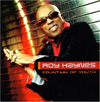|
Broken Window
This Week: Yamagata’s heartbreak, Haynes’ youth, and The Polyphonic Spree’s energy
Rachael Yamagata

Happenstance (RCA)
There’s a window after you’ve broken up with someone where you get to mope, sleep a lot, and feel sorry for yourself.
Your friends invent opportunities for you to leave the apartment, but they know why you’re hanging back and being unusually quiet. Rachael Yamagata has created the sonic equivalent of this time with her major-label debut, Happenstance.
Yamagata’s smoky, sexy voice and lilting piano-driven tunes go down smooth and evaporate like cotton candy in your mouth. The standout track, the radio-sugar “Worn Me Down,” is the closest she gets to anger, singing, “Worn me down like a road/ I did everything you told/ worn me down to my knees/ I did everything to please.” Its pop perfection makes you wish she’d let herself have a few more moments of catchy, righteous indignation. “Reason Why” and “I’ll Find a Way” are lush musical goodbyes, richly-textured songs that wash over you and make you want to drink.
It’s not all depressing; there are hints of recovery. The hopeful and sexy “Under My Skin” is about an undeniable attraction she doesn’t feel strong enough yet to let herself feel. “1963” stands out as the one pure, giddy, “in love” song.
While most of her lyrics are of the confessional journal variety, occasionally she hits you with a simple gem like, “It’s not that I don’t want to be with you/ But you only wanted me/ the way you wanted me.” This is music by which to indulge your bruised and battered heart.
—Laila Shahrokhi
Roy Haynes

Fountain of Youth (Dreyfus)
Roy Haynes’ 40-something visage beams from the CD cover photo, mocking Father Time. Only his hands hint at his true 79 years, as otherwise neither his appearance nor sound would suggest anything other than an artist dawning on his prime. Not that Fountain of Youth, Haynes’ aptly titled recent release, is his most polished recording. Nor is it particularly original. However, it is addictive; its unmitigated exuberance and range of mood insist on repeated listening.
Youth’s success lies not only in Haynes’ driving and sensitive drum kit, but as well in the enthusiasm of his young band. Perhaps the thrill of being live at Birdland with an icon compels their energy. Opening with Marcus Strickland on bass clarinet, the first cut “Greensleeves” conveys a relaxed unhurried tempo, but by the last bar Haynes has orchestrated an emotional continuum, through Strickland’s skirling soprano sax solo, pianist Martin Bejerano’s growing urgency, and John Sullivan’s pensive arco bass. It’s a captivating performance, with touches of Coltrane and Tyner.
But the most representative tune on the disc is the Metheny original “Question and Answer.” In this rendering, the tune’s persistent two-note figure serves as recurring milestone for an improvisation-laden extended cover, a no-holds-barred evening closer well-rewarded by the audience. Fountain of Youth’s habit-forming charms are easy and well worth succumbing to.
—Jonathan B. Frey
The Polyphonic Spree

Together We’re Heavy (Good Records)
Over the past year, The Polyphonic Spree has been busy. The Dallas-based 24-piece symphonic choral pop band has been featured in movies, commercials and on NBC’s Scrubs just to name a few. The group has been on tour throughout Europe with David Bowie, and yet, it was able to complete a dazzling second album. This follow up to the group’s The Beginning Stages of... exemplifies how the group has continued to mature in the studio, capturing the uplifting energy of its live show. The Spree’s live production with all 24 members features a nine-person chorus, a harp player, a horn section, plus all the fixin’s of a rock band.
Together We’re Heavy is a cohesive album that reflects real emotion and feeling with completely produced thematic elements that are often lost in pop music. The album flows through dramatic peaks and valleys with cohesive transitions that, at times, float in space and at other times charge along at the speed of sound. The lyrics of the group’s spiritual leader Tim McLaughter reflect a reserved optimism, conscious of pain and sadness.
Don’t be surprised if you hear The Polyphonic Spree infecting the musical mainstream from the fringes of pop culture, steering it towards a more positive horizon.
—Nick Corrigan

July 29, 2004 • Vol. 14, No. 31
© 2004 Metro Pulse
|
|